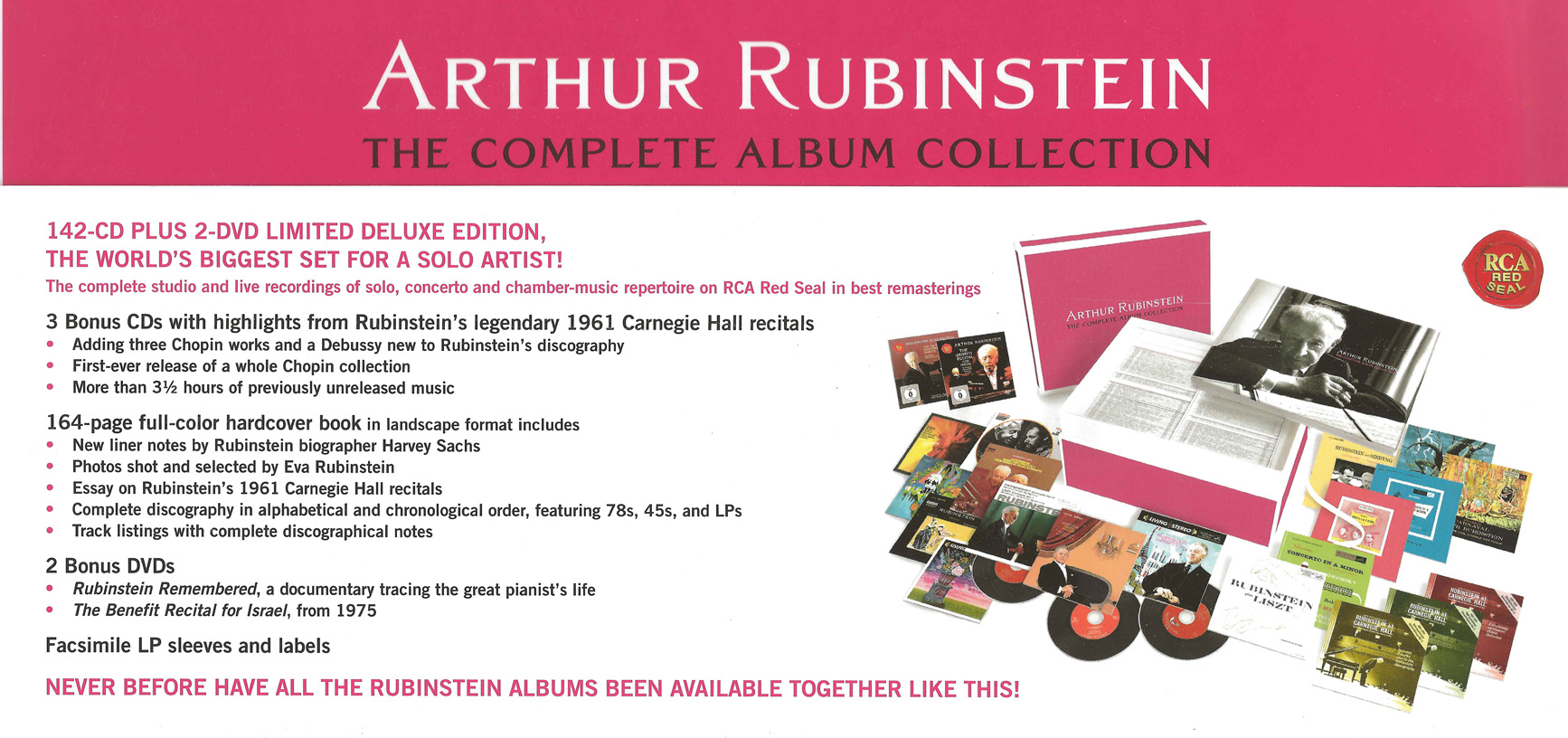Piano Works by Chabrier / Fauré / Milhaud / Poulenc
with Arthur Rubinstein
Media Review / Listening Diary 2014-04-30
2014-04-30 — Original posting (on Blogger)
2014-11-11 — Re-posting as is (WordPress)
2016-07-20 — Brushed up for better readability
Table of Contents
Exploring the Fringes of Rubinstein’s Recording Repertoire…
Rubinstein Playing Music from France
This posting is about compositions by French composers that Arthur Rubinstein recorded early in his recording career (1938 – 1949, on 78’s, still), and/or which he only (re)turned to in 1963, for a single LP with French music. All of this is of course included in the recently released “Arthur Rubinstein — The Complete Album Collection“:
The CDs
Arthur Rubinstein Collection, CDs #11 -14
Arthur Rubinstein — The Complete Album Collection
CDs #11 – 14: The Early Recordings 1938 – 1949
SONY Classical 88691936912 (142 CDs / 2 DVDs, mono / stereo); ℗ / © 2011
Documentation 162 pp., track listing on CD sleeve

Arthur Rubinstein Collection, CD #89
Arthur Rubinstein — The Complete Album Collection
CD #89: Ravel: Valses nobles et sentimentales, La vallée des cloches; Poulenc: Mouvements perpétuels, 2 Intermezzi; Fauré: Nocturne; Chabrier: Scherzo-Valse
SONY Classical 88691936912 (142 CDs / 2 DVDs, mono / stereo); ℗ / © 2011
Documentation 162 pp., track listing on CD sleeve

Emmanuel Chabrier (1841 – 1894)
Arthur Rubinstein recorded one single composition by Emmanuel Chabrier. It’s the last one of “10 Pièces pittoresques“, composed in 1881, “Scherzo-valse“, annotated Vivo. This is a short, but real fun piece (4’33”); play- and joyful. It almost sounds like Haydn — except for the final chords / harmonies, which remind us of the piece’s origin in France, in the late 19th century. I like Rubinstein’s interpretation (from 1963), maybe with the only minor reservation of a couple of instances when the tempo appears to accelerate without obvious reason. Piano compositions may be a minor component in Chabrier’s oeuvre — but still it is a pity Rubinstein didn’t explore this composer to a larger extent.
Gabriel Fauré (1845 – 1924)
The above collection includes two recordings (1949 and 1970) of the Piano quartet Nr.1 in C minor, op.15, by Gabriel Fauré. Apart from that, Rubinstein recorded just one single composition by this French composer, even though Gabriel Fauré produced a substantial body of piano and chamber music compositions. That one composition, the last one of the 3 Nocturnes op.33, an Andante con moto in A♭ major, was recorded twice. There is an early recording from 1938 (mono, obviously, for 78’s, duration: 3’36”), and a second one (stereo, for LP, duration: 3’55”) in 1963.
The two interpretations aren’t dramatically different: the first one is a tad faster, more impulsive, using slightly more agogics, but both are excellent in their rhythmic tension, often almost swinging. Inevitably, the newer recording has far better sound and transparency. The balance between melody and accompaniment is far better. It is hard to tell how much of this is “just” the recording technique, and how much Rubinstein’s interpretation / articulation and dynamic balance has changed over the 25 years between these two recordings. The nocturne itself is a really nice piece, maybe with a certain “earworm potential”.
Darius Milhaud (1892 – 1974)
Darius Milhaud was a very productive and influential composer, but from a different period than the two above. With his inclination towards Jazz and jazzy music in general, he may indeed be in the fringes of Rubinstein’s scope of interest. Only three short movements from his “Saudades do Brasil”, op.67 were ever recorded by Arthur Rubinstein: 5. Ipanema (1’40”), 9. Sumaré (1’31”), and 11. Laranjeiras (1’04”), back in 1946.”Ipanema” is dedicated to Arthur Rubinstein. All three pieces are found on the first CD shown above.
Rubinstein plays these three pieces very well: one easily forgets / ignores the sound limitations in these mono recordings! He is excellent at capturing the polyrhythmic texture of these compositions, and one may wonder why he did not play more of such music! These pieces were among Rubinstein’s last recordings for 78’s. They are mono, of course, but the sound and the clarity otherwise are very reasonable.
Francis Poulenc (1899 – 1963)
Francis Poulenc was born 7 years after Milhaud. His compositions are rare in Rubinstein’s recording history. However, they still outnumber the single piece by Darius Milhaud (see above).
Napoli, FP 40
Rubinstein recorded three groups of pieces; one group is “Napoli” (FP 40, composed 1925), which he recorded in 1947 — mono, still for 78’s. The 3 pieces in “Napoli” are
- Barcarolle: assez animé (1’39”)
- Nocturne: lent (2’51”)
- Caprice italien: presto (4’42”)
These are tree very nice pieces, very well-played. It’s a pity that Rubinstein did not re-record these later, with better sound technique. These are technically demanding pieces (especially 1 and 3). The sound is OK, but somewhat dull and lacking transparency, maybe from limitations in the microphones, but more likely due to the “sound cleaning”, i.e., the elimination of hiss and other noise from the original recording. The melody voice comes through reasonably well, but in the fast pieces, the accompaniment in the left hand is often hard to resolve acoustically.
3 Mouvements perpétuels, FP 14
In contrast, the “3 Mouvements perpétuels” (FP 14, composed in 1919) were recorded twice: once in 1938 (mono, 78’s), and then again in 1963, in stereo, for the above LP:
- Assez modéré (1938: 1’03” — 1963: 1’18”)
- Très modéré (1938: 0’47” — 1963: 1’42”)
- Alerte (1938: 2’13” — 1963: 2’31”)
The early recording suffers from the limitations just mentioned. Plus, Rubinstein then was primarily focusing on virtuosity. All movements are considerably faster than in the 1963 recording, the Assez modéré is more like an Allegro, the Très modéré more like an Andante con moto. In the newer recording, Rubinstein stays closer to the tempo annotation, and to the title Mouvements perpétuels, i.e., “continuous movements”. He is also much clearer in the articulation, and the sound technique adds the necessary transparency. Nice and very entertaining pieces as well, of course!
Intermezzi, FP 71, No.2 and FP 118
Finally, the newer recording adds two of Poulenc’s three Intermezzi:
- Intermezzo in D♭ major, FP 71, No.2 (composed 1934 — 2’49”)
- Intermezzo in A♭ major, FP 118 (composed 1943 — 4’15”)
Nice pieces, very well-played. Very likely this is music that Rubinstein used as encore in his concerts. He must have liked these pieces and didn’t just include them to please the audiences in the country in which he lived for many years. At the same time, unfortunately, Poulenc failed to attract more of his interest, so the coverage remained very fragmentary .
Listening Diary Posts, Overview






